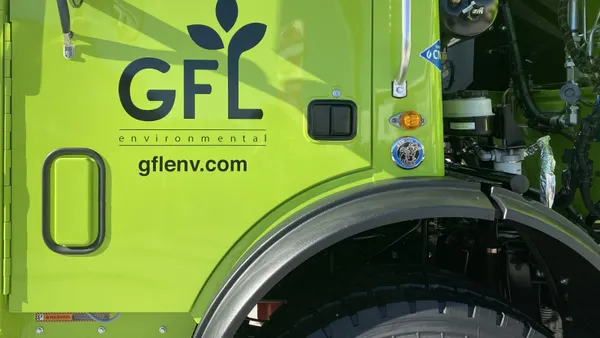Dive Brief:
- Fitch has given Waste Pro a long-term issuer default rating of B+, the company’s first credit rating from Fitch. Fitch attributed the credit rating to Waste Pro’s established position in the Southeast, with numerous multi-year service contracts and a “selective” contract bidding and renewal process.
- However, Fitch noted that the company’s “smaller scale of cash flow relative to investment opportunities” and regional focus mainly on collection services exposes it to weather factors and local competition.
- The new Fitch rating comes as the company aims to refinance about $480 million in debt before certain bonds mature in 2026, said executive vice president and CFO Cort Sabina. Waste Pro has been rated by S&P and Moody’s since 2017, when it launched its first high-yield bond offering.
Dive Insight:
Waste Pro describes itself as the fastest-growing private waste company in the Southeast and has focused much of its business on residential and commercial waste collection services. The company aims to grow steadily through acquisitions, with a goal of achieving $1.3 billion in revenue in 2024.
Beyond the B+ default rating, Fitch also assigned Waste Pro’s asset-based lending a BB+/RR1 rating and gave its senior unsecured bonds a BB-/RR3 rating. Waste Pro has a mostly fixed-rate debt mix, which Fitch says benefits from advantaged tax-exempt bonds. Aside from the upcoming maturity of $480 million in unsecured bonds, the company also has $21 million in debt amortization in 2024 and another $23 million in 2025, Fitch said.
Fitch notes that Waste Pro’s stability comes partly from the fact that about 73% of its revenue is from residential and commercial waste collection services, which benefits from “consistent” waste generation that is somewhat protected from economic headwinds. Another stabilizing factor is the length of its municipal contracts, which are anywhere from five to 10 years.
Waste Pro's open market contracts accounted for about 40% of revenue in 2023, according to Fitch. Those contracts have allowed for Waste Pro to make more frequent, higher price adjustments compared to its restricted price contracts.
Sabina said Waste Pro has not had much pushback on price because other competitors in the region have recently increased rates, “and it’s easy for us to raise rates because we’re following that.”
That strategy could help balance with lines of business Fitch says are more “susceptible to business cycles,” such as construction and demolition. Fitch also expects Waste Pro to shed some of its less profitable contracts in 2024 as it works to grow volume.
Fitch notes the pros and cons of Waste Pro’s “collection-heavy” operations. Larger MSW competitors in the region benefit from being vertically integrated, it said. However, Waste Pro’s “disposal-neutral” markets give it more disposal options, which could reduce longer-term liability exposure.
The rating agency estimates these factors, along with its pricing strategy, will help Waste Pro achieve a 2024 earnings before interest, taxes, depreciation and amortization leverage of 4.2x, down from 4.8x in FY23.
In the medium term, Fitch expects the company to maintain EBITDA interest coverage in the low-to-mid 4.0x range, except for in the case of large acquisitions. Fitch estimates the company’s EBITDA debt leverage could move into the 4.5x to 5x range during “significant growth periods.”
Fitch expects Waste Pro to continue to prioritize growth in 2024. Sabina said the company has already spent $65 million on acquisitions this year and expects to spend about $100 million total for the year. He described the “immediate pipeline” of opportunities that could close in the next six to 18 months to be around $300 million.
In a May interview with Waste Dive, CEO Sean Jennings and COO Keith Banasiak also noted the M&A environment was more active than it had been in previous years, due in part to higher operational costs for small haulers.
Beyond M&A spending, Waste Pro’s capital spending is focused mainly on truck and container purchases. The estimated capex budget for 2024 is about $140 million, Sabina said, which includes work that has already been awarded, along with growth capital and maintenance capital.
Fitch estimates that Waste Pro’s capital expenditures will be about 12% of revenue in 2024, “equally split between maintenance and growth initiatives,” but will slightly reduce in the following years due to slower organic revenue growth. Fitch also highlighted what it considers the “attractive return profiles of bolt-on M&A and growth capex.”











